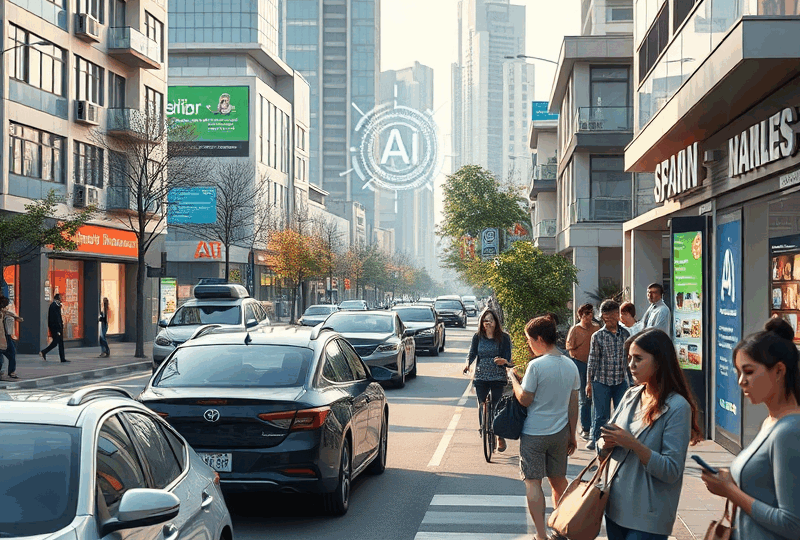
AI in Daily Life: How Artificial Intelligence is Revolutionizing Everyday Experiences

Artificial Intelligence (AI) is no longer a futuristic concept—it’s here, and it’s transforming the way Americans live, work, and interact with the world. From smart home devices to personalized healthcare, AI is embedded in our daily routines, often in ways we don’t even notice. In this article, we’ll explore how AI is revolutionizing everyday experiences across various sectors in the United States, with a focus on accuracy, reliability, and practical applications.
Smart Homes: AI at Your Fingertips
AI has become a cornerstone of smart home technology in the U.S. Devices like Amazon Alexa, Google Nest, and Apple HomeKit use machine learning to understand user preferences and automate tasks. These systems can control lighting, temperature, security, and even kitchen appliances. According to a 2022 report by Statista, over 60 million U.S. households use smart home devices, a number expected to grow steadily.
Smart thermostats like Nest learn your schedule and adjust heating and cooling to save energy. AI-powered security systems can distinguish between a family member and a stranger, sending alerts only when necessary. These conveniences not only improve comfort but also contribute to energy efficiency and home safety.
Healthcare: Personalized and Predictive
AI is making healthcare more accessible and efficient in the U.S. Tools like IBM Watson Health and Google Health are helping doctors analyze patient data, predict outcomes, and recommend treatments. AI algorithms can detect diseases such as cancer and diabetic retinopathy with accuracy comparable to human specialists.
Wearable devices like Fitbit and Apple Watch use AI to monitor heart rate, sleep patterns, and physical activity. These insights can help users make informed health decisions and even alert them to potential medical issues before symptoms appear. According to the American Medical Association, AI is expected to play a critical role in preventive care and chronic disease management.
Transportation: Smarter, Safer Roads
From GPS navigation to autonomous vehicles, AI is reshaping transportation in the U.S. Ride-sharing platforms like Uber and Lyft use AI to optimize routes, reduce wait times, and predict demand. AI also powers real-time traffic updates and predictive maintenance for public transit systems.
Autonomous vehicles, such as those developed by Tesla and Waymo, rely on AI to interpret sensor data, recognize objects, and make driving decisions. While fully self-driving cars are still being tested, semi-autonomous features like lane assist and adaptive cruise control are already enhancing road safety.
Finance: Smarter Money Management
In the financial sector, AI is used for fraud detection, credit scoring, and algorithmic trading. AI algorithms analyze vast amounts of financial data to detect anomalies, enhancing transaction security. Robo-advisors like Betterment and Wealthfront offer automated financial advice based on user goals and risk tolerance, making investing more accessible.
Banks and fintech companies use AI chatbots to provide 24/7 customer service, helping users manage accounts, make payments, and resolve issues without human intervention. According to a 2021 McKinsey report, AI could deliver up to $1 trillion of additional value each year in the global banking sector.
Retail and E-commerce: Personalized Shopping
AI is revolutionizing how Americans shop, both online and in-store. Retailers like Amazon and Walmart use AI to recommend products, manage inventory, and optimize pricing. Personalized marketing, powered by AI, ensures that consumers see products tailored to their preferences and behavior.
In physical stores, AI-driven cameras and sensors track customer movement to improve store layouts and reduce checkout times. AI also supports virtual try-on tools and chatbots that enhance the customer experience. According to the National Retail Federation, AI adoption in retail has increased significantly since 2020, driven by consumer demand for convenience and personalization.
Education: Customized Learning Experiences
AI is transforming education by enabling personalized learning paths. Platforms like Khan Academy and Coursera use AI to adapt content based on student performance. AI tutors can provide instant feedback, helping students understand complex topics at their own pace.
In classrooms, AI tools assist teachers in grading, identifying learning gaps, and managing administrative tasks. According to the U.S. Department of Education, AI has the potential to improve educational outcomes by making learning more engaging and tailored to individual needs.
Entertainment and Media: Smarter Content Curation
Streaming platforms like Netflix, Spotify, and YouTube use AI to recommend content based on viewing history and preferences. These algorithms analyze user behavior to deliver a personalized entertainment experience.
AI is also used in content creation. For example, AI-generated music and video editing tools are becoming more sophisticated, allowing creators to produce high-quality content with minimal effort. In journalism, AI assists in fact-checking and summarizing news articles, improving both speed and accuracy.
Legal and Ethical Considerations
As AI becomes more integrated into daily life, ethical concerns such as data privacy, algorithmic bias, and job displacement must be addressed. In the U.S., organizations like the Federal Trade Commission (FTC) and the National Institute of Standards and Technology (NIST) are working on guidelines to ensure responsible AI use.
Transparency, accountability, and fairness are essential to building public trust in AI technologies. Users should be aware of how their data is collected and used, and developers must strive to eliminate biases in AI systems.
Conclusion: Embracing the AI-Powered Future
AI is not just a technological trend—it’s a transformative force shaping the future of American life. From enhancing convenience at home to improving healthcare outcomes and financial decision-making, AI offers immense benefits. However, responsible implementation and ongoing oversight are crucial to ensuring that these advancements serve everyone fairly and ethically.
Disclaimer
This article is for informational purposes only and does not constitute professional advice. While every effort has been made to ensure the accuracy of the information provided, the author and publisher make no guarantees regarding the completeness or reliability of the content. Readers are encouraged to consult with qualified professionals for specific guidance related to AI technologies or any mentioned services.
Sources:
– Statista (2022). Smart Home Market in the U.S.
– American Medical Association (2021). AI in Healthcare.
– McKinsey & Company (2021). The Future of AI in Banking.
– U.S. Department of Education (2020). Artificial Intelligence in Education.
– National Retail Federation (2021). AI Trends in Retail.








답글 남기기